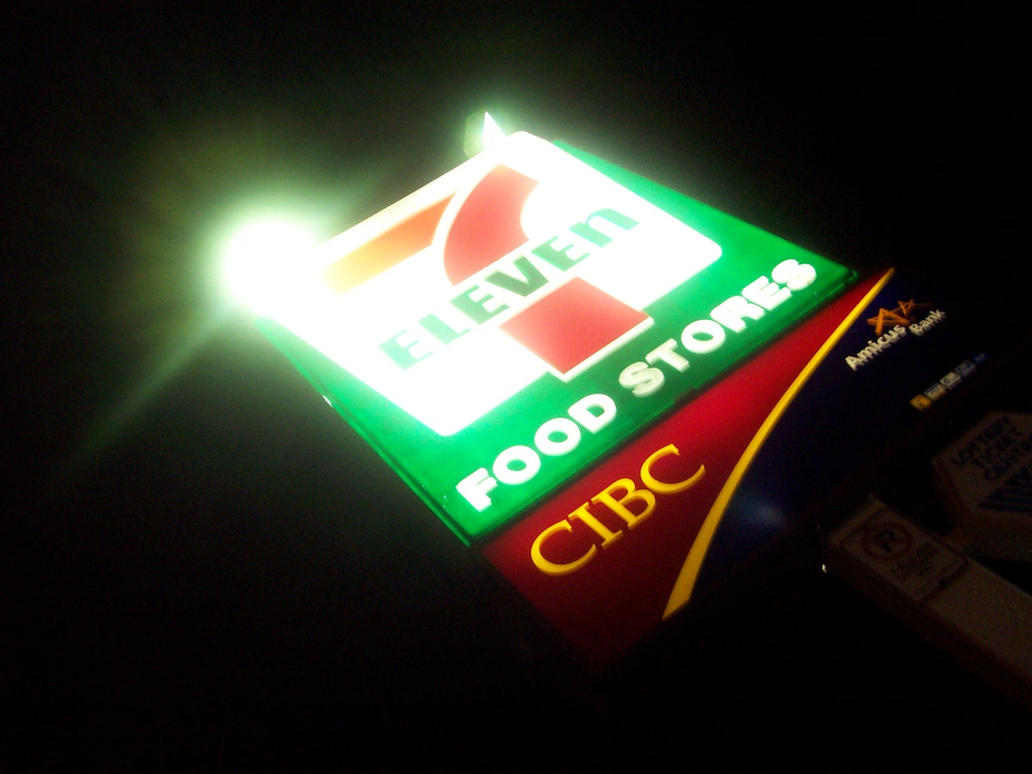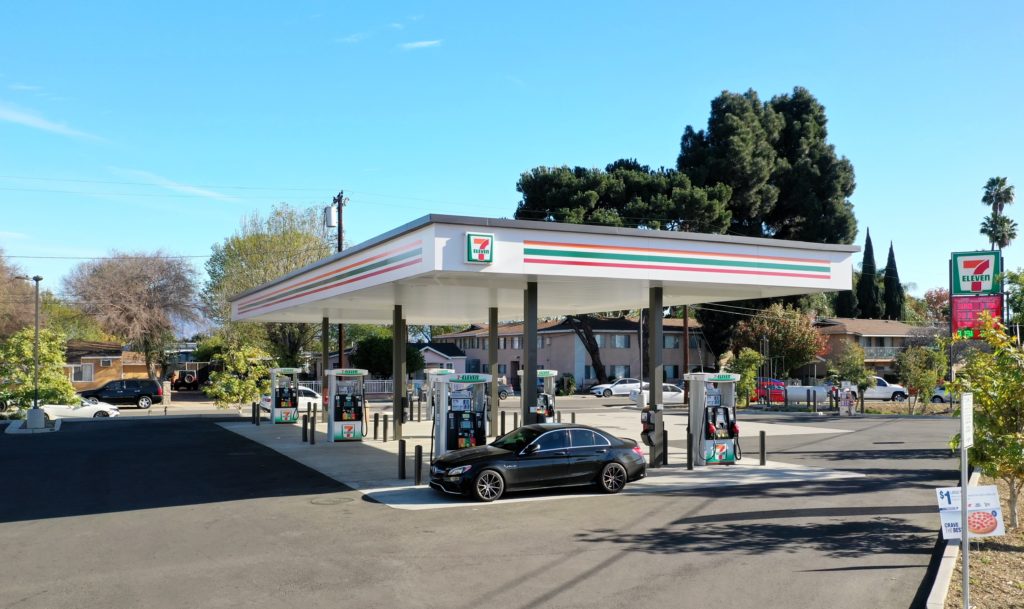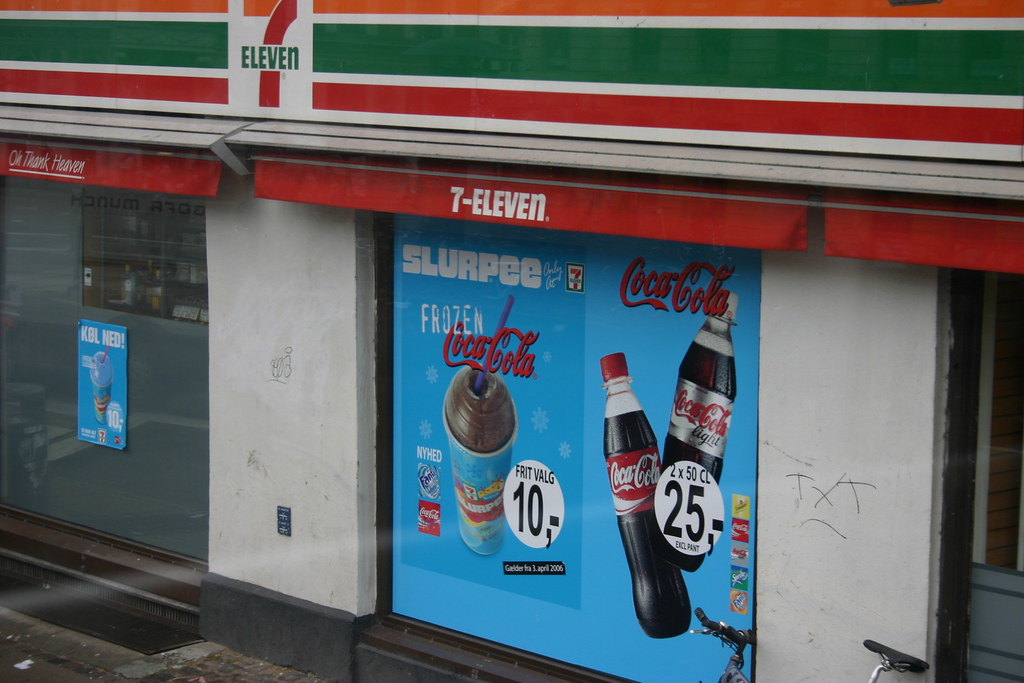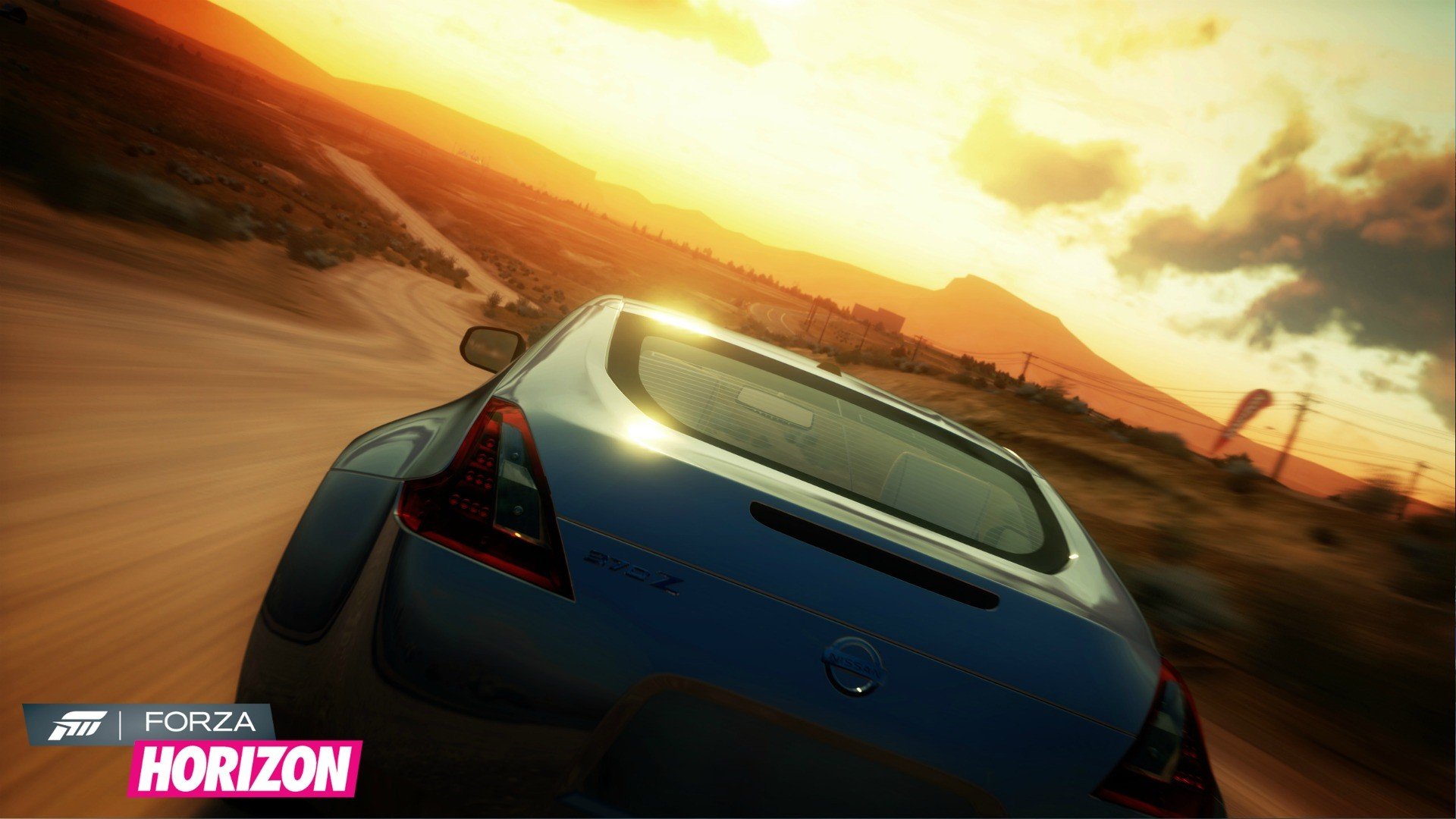7-Eleven Inc. is the world's largest convenience store chain operating, franchising and licensing more than 56,600 stores in 18 countries, of which nearly 10,500 are in North America. The company has more outlets than any other retailer or food service provider,according to its website. In addition to 7-Eleven stores, 7-Eleven, Inc. operates and franchises Speedway®, Stripes®, Laredo Taco Company® and Raise the Roost® Chicken and Biscuits locations. Known for its iconic brands such as Slurpee®, Big Bite® and Big Gulp®, 7-Eleven has expanded into high-quality sandwiches, salads, side dishes, cut fruit and protein boxes, as well as pizza, chicken wings and mini beef tacos. 7-Eleven offers customers industry-leading private brand products under the 7-Select™ brand including healthy options, decadent treats and everyday favorites at an outstanding value. Find out more online at www.7-Eleven.com, via the 7Rewards customer loyalty platform on the 7-Eleven mobile app, or on social media at Facebook, Twitter and Instagram.
In 1928, a Southland executive brought a totem pole as a souvenir from Alaska and placed it in front of the store. The pole served as a marketing tool for the company, as it attracted a lot of attention. Soon, executives added totem poles in front of every store and eventually adopted an Inuit-inspired theme for their stores.
Later on, the stores began operating under the name "Tote'm Stores." In the same year, the company began constructing gasoline stations in some of its Dallas locations as an experiment. Joe Thompson also provided something you could only find at his store, he trained the staff so that people would receive the same quality and service in every store. Southland also started to have a uniform for its ice station service men. This became a good part in the company's success as a convenience store. The company estimates between the organization and independent 7-Eleven franchise owners, more than 50,000 employees were hired during a time when many businesses were forced to shut down and unemployment escalated to record highs.
In 1992 Southland completed additional financing for a $400 million commercial paper facility backed by Ito-Yokado. Also in 1992, Southland decided to leave the distribution and food processing business to focus on its core business, 7-Eleven. The company sold certain distribution centers and food processing facilities to McLane Co., Inc., a subsidiary of Arkansas-based Wal-Mart stores. Southland also signed a service agreement with McLane, the country's largest convenience store distributor, to provide coast-to-coast distribution service to the company's 5,700 stores in the United States. For 62 years, the Southland name united many diverse businesses while preserving our heritage.
However, ten years ago Southland began divesting its other operations to focus on convenience retailing and has consequently decided to rename the company '7-Eleven, Inc.', better reflecting our business focus. The name is appropriate now because 7-Eleven's strategic initiatives have brought about such dramatic changes in performance and culture that the company truly is not the same. 7-Eleven is again raising customer expectations as new information systems enable store managers and franchisees to anticipate customers' needs and serve them better.
Each day, a network of commissaries, bakeries and distribution centers provides 7-Eleven stores with an unmatched selection of the freshest products, yielding true differentiation. This unique, proprietary infrastructure creates a strategic advantage over competitors and will enable 7-Eleven to produce sustainable and profitable growth over the long term. 7-Eleven will enter the new millennium a transformed company with new business tools and a name that reflects its identity and focus. It's kind of like Kleenex - sure, there are other convenience stores in our community, but we always seem to call them 7-Eleven. It was 1927 when father Joe C. Thompson became an employee of Southland Ice Company in Dallas. He bought 2,500 shares at $10 each in the new company at its formation, and was elected a director at the inaugural meeting that same year.
This is when the concept of the convenience store was pioneered. Southland began by selling blocks of ice to refrigerate food. Very quickly they began offering milk, bread and eggs on Sundays and evenings.
But the eventual decline of ice plants and horse drawn wagons forced Thompson to think fast. So, through small stores using their chilling facilities, he began serving communities milk, cold drinks and groceries. It was an immediate success in Texas and the South, and then Washington, D.C. 7-Eleven Stores began changing its operation several years ago to compete with another quickly-growing chain of convenience stores that was moving into the Oklahoma City area.
The retailer began replacing older stores with larger ones like this one pictured in northwest Oklahoma City in 2015. The newer stores offer customers improved selections of products inside and more fuel pumps outside. On Friday, 7-Eleven Inc. announced it is buying 7-Eleven Stores for an undisclosed amount. 7-Eleven Stores' location at 3000 S Council Road in Oklahoma City is shown.
The latest operations built by 7-Eleven Stores in central Oklahoma offer customers enhanced shopping options. On Friday, 7-Eleven Inc. announced it has reached agreement to acquire 7-Eleven Stores for an undisclosed amount. All is well with one of America's most beloved convenience stores. In October 2017, four 7-Eleven franchisees filed a class action lawsuit alleging the company misclassified franchise owners in California as independent contractors instead of employees. The plaintiff-franchisees sought hundreds of thousands of dollars in overtime pay and business expenses for each franchisee. But on March 14, 2018, the presiding judge put the plaintiffs' Big Gulp gamble to rest, ruling that the franchisees are, in fact, independent contractor franchisees, and not employees, under California law or the FLSA.
You can find 7-Eleven stores on many prominent street corners throughout the United States and in shopping malls, airports, and anywhere else people may need a hot cup of coffee or a quick snack to go. In the past, 7-Eleven was well-known for offering fuel, but today, the store's brand has expanded to include locations that provide only food and beverage products. More locations carry the items you love from this iconic store. Southland decided to go with the new name; it unified the company's diversified stores and provided a distinct identity, a key ingredient in the successful operation of numerous retail outlets. Joseph Thompson, secretary-treasurer of Southland Ice, unified the stores further by training staff with daily sales talks.
Thompson recognized early on that consumers should receive the same quality and service at every store. During this time Southland also began to experiment with constructing and leasing gasoline stations at ten of its Dallas-area stores. The world's largest convenience store chain is growing at a blistering pace, packing more markets into regions where the company is already established. But this unprecedented expansion is meeting resistance in some cities over concerns including crime, traffic and health.
7-Eleven can be found in the Republic of Korea convenience store market in many places, where it competes with Ministop, GS25 , FamilyMart, and independent competitors. There are 7,064 7-Eleven stores in the Republic of Korea; with only Japan, the United States, and Thailand hosting more stores. The first 7-Eleven store in the Republic of Korea opened in 1989 in Songpa-gu in Seoul with a franchise license under the Lotte Group.
In January 2010, Lotte Group acquired the Buy the Way convenience store chain and rebranded its 1,000 stores under the 7-Eleven brand. 7-Eleven was founded in 1927 by Southland Ice Company employee John Jefferson Green. He began by selling eggs, milk, and bread from the company's ice house storefronts in Dallas, Texas. The company survived the Great Depression, and after World War II, the company's name was changed to 7-Eleven to reflect the stores hours of operation. Today, 7-Eleven Inc. is a Japanese-American international chain of convenience stores with its headquarters in Dallas, Texas.
Seven-Eleven Japan Co., Ltd has been its parent company since 2005, operating, franchising, and licensing 68,236 stores in seventeen countries as of June 2019. Southland may well have rebounded by the early 1990s were it not for competition from convenience stores operated by the major oil companies. Although these stores emphasized gasoline retailing rather than other merchandise, they did sell the primary products of convenience stores--soft drinks, cigarettes, and beer.
Their sheer number and financial strength changed the nature of the convenience retailing industry. Their effort was exacerbated by the decline in the U.S. economy that began in the late 1980s. Southland, along with a number of other convenience store chains, had limited capital to invest in its store base due to heavy debt loads. By 1945 Southland owned stores scattered over north-central Texas, operating from 7 in the morning to 11 at night, seven days a week. In 1946 the firm Tracey-Locke, commissioned to create a new name, chose '7-Eleven' to emphasize the firm's commitment to long operating hours to serve customers better.
At this time Southland remodeled all 7-Eleven stores, doubling the amount of floor space at each retail outlet. The convenience store chain is giving away free AirPods to the first 500 people who spend at least $50 on its new 7NOW delivery app. In 1946, in an effort to continue the company's post-war recovery, the name of all the stores were changed to 7-Eleven to reflect the stores' new hours of operation, which were unprecedented at the time. In 1969, 7-Eleven tried to do a 24-hour schedule in Austin, Texas, after an Austin store stayed open all night to satisfy customer demand.
Later on, 24-hour stores were created in Fort Worth and Dallas, Texas, as well as Las Vegas, Nevada. In 1971, Southland acquired convenience stores of the former Pak-A-Sak chain owned by Graham Allen Penniman, Sr. (1903–1985), of Shreveport, Louisiana. In 1927, Southland Ice Company employee John Jefferson Green began selling eggs, milk, and bread from one of 16 ice house storefronts in Dallas, with permission from one of Southland's founding directors, Joe C. Thompson, Sr. Although small grocery stores and general merchandisers were available, Thompson theorized that selling products such as bread and milk in convenience stores would reduce the need for customers to travel long distances for basic items. He eventually bought the Southland Ice Company and turned it into Southland Corporation, which made sure the stores in Dallas were doing it right.
The new store concept offers an assortment of exclusive products, including fresh daily sandwiches, hot breakfast sandwiches and Nitro cold brew. The new store will be open 24 hours a day, seven days a week. This includes approximately 3,800 Speedway® stores recently acquired from Marathon Petroleum Corporation. The 7-Eleven convenience store and gas station is conveniently located at 2600 North and Washington Boulevard.
Franchise owned and operated by StuSan Inc. since August of 2011, owners Stu and Susan Wallace, along with their daughter Tracy Drollinger, bring over 60 years of combined experience operating 7-Eleven stores. The newly formed Southland Ice Company was composed of four separate ice companies and operated eight ice plants and 21 retail ice stations. An early attempt at advertising occurred after one Southland manager visited Alaska in 1928. Upon his return to Texas, he planted a souvenir totem pole in front of his store.
The pole attracted so much attention that the employees suggested placing one at every Southland-owned retail ice dock and naming the stores 'Tote'm Stores,' since the consumers toted away their purchases. 'Jodie' Thompson, one of five founding directors of the Dallas Southland Ice Company, with a new idea. He wanted to sell milk, eggs, and bread through his retail ice dock. 'You furnish the items,' he suggested, 'and I'll pay the power bills.' Thompson agreed, and together they established the first known convenience store. The addition of Trojan Horse private label wine to 7-Eleven's offerings further blends the lines between convenience store and grocery store.
As the smaller retailer expands inventory, consumers can now do more of their traditional super market shopping there. One area where large markets used to dominate their c-store counterpart was in the wine aisle. 7-Eleven was once the convenience store you would pull into during a road trip for gas, a Slurpee and bag of chips. You can still get all of those things at the convenience store today, but now consumers also can add a bottle moderately priced wine to the basket.
The new products show the convenience store chain is trying to shed its old-school image with a few higher, more upscale items it hopes visitors will be tempted to grab when stopping in. Previously they would have had to trek to an IRS Taxpayer Assistance Center. In Taiwan, 7-Eleven is the largest convenience store chain and is owned by President Chain Store Corporation under Uni-President Enterprises Corporation. The first store opened in 1979 and the 5,000th store was opened in July 2014. 7-Eleven opened its first store in Mainland China in Shenzhen, Guangdong in 1992 and then later expanded to Beijing in 2004, Chengdu and Shanghai in 2011, Qingdao in 2012, and Chongqing in 2013.
In Mainland China's 7-Eleven stores where Slurpees are offered, the Chinese name 思乐冰 (sīlèbīng) is used. They also offer a lot of warm food, with items like steamed buns, and stores in Chengdu offer a full variety of onigiri (饭团). Beverages, candy, and other convenience items are available as well.
Over the past year, Instacart has become many people's solution to grocery shopping. Through its recent collaboration with 7-Eleven, the brand brings even more convenience to consumers. In as fast as 30 minutes, those 7-Eleven favorites can be delivered from the store to the door. It seems that America's convenience store has found a way for customers to be even more grateful for its shopping offers. Over the past year, more people have turned to the 7NOW delivery app as well as the convenience store itself to be the answer to all their shopping needs.
Besides that extra gallon of milk that is always needed, the popular convenience store is looking to ensure that the to-do list gets completed. The new store, located at 7530 Village Square Drive, celebrated with five days of freebies for customers – everything from coffee to hot dogs and pizza and of course Slurpees and Big Gulps. Music entertainment by KYGO and scratch card giveaways provided by Colorado Lottery were a few of the fun activities. As good neighbors and showing support for the community's first responders, 7-Eleven staff made a surprise delivery of fresh brewed coffee and donuts to the local South Metro fire station. Alcohol delivery, including beer, wine and liquor, is available in select markets to customers age 21 and older. Available in over 1,300 U.S. cities, the 7NOW app provides real-time tracking that lets customers know when to expect their orders, typically in 30 minutes or less.
The 7NOW delivery app can be downloaded fromGoogle Play, theApp Storeor by visiting7NOW.com. Another key strategy that Southland adopted to revitalize the chain was to improve the quality and value of the convenience items and services offered by the stores. This included moving toward daily deliveries of fresh perishables and the introduction of new ready-to-eat fresh foods, such as sandwiches and pastries, and eventually dinner entrees. 7-Eleven stores also began an aggressive expansion of the financial services it offered.
Having already gained the position as the U.S. retailer with the most ATM machines, Southland began offering prepaid phone cards in 1995 and quickly became a leading seller of money orders. In 1998 the company began selling pagers and pager services in all U.S. 7-Elevens. After a successful trial at 36 Austin, Texas stores, Southland began planning for the expansion of the centers into more than Elevens in the Dallas-Fort Worth area. Southland's remodeling program continued throughout the mid-1990s.
By 1996 the company had completed the most extensive store remodeling program in its history. The new 7-Eleven look included improved exterior and interior lighting, a store layout with wider aisles and better organization, improved signage, and upgraded gasoline pumps that included pay-at-the-pump systems. 7-Eleven stores also changed their pricing policies, most notably doing away with what Southland itself called 'insult pricing'--the huge markups that customers were forced to pay for convenience. The chain thereby lowered prices on much of its inventory, adopting an 'everyday fair pricing' policy.
In addition, Southland closed additional underperforming stores in the mid-to-late 1990s, shuttering 202 units from 1996 through 1998. Also in 1978, Southland bought Chief Auto Parts, a California chain of 119 retail automobile parts stores. By 1986 Chief Auto Parts was the largest convenience retailer of automobile parts in the nation, operating 465 stores. Another Southland acquisition was Tidel Systems, a manufacturer of cash-dispensing systems and underground gasoline-tank-monitoring systems. At a management meeting in Washington, D.C., in 1956, a blizzard blanketed the city. Southland began to focus on the traffic patterns around potential store sites, choosing high-volume corners whenever possible.






























